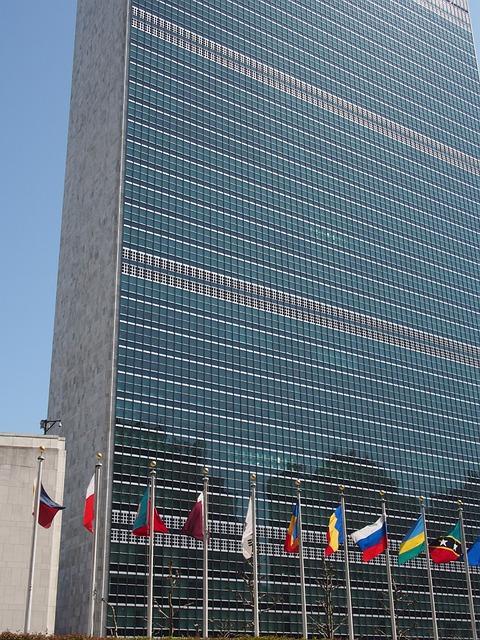Understanding the Significance of UN Security Council Resolution 2334
By Yoav Tenembaum
Published on December 28, 2016

United Nations Security Council Resolution 2334 of the 23rd of December, 2016, which refers to anything Israel built beyond the lines of June 1967 (Six Day War) as illegal, deserves a closer reading to understand its significance.
To begin with, the aforementioned resolution stresses explicitly that it applies also to the parts of Jerusalem captured by Israel during the Six Day War. Thus, all the Jewish neighbourhoods situated in the eastern part of Jerusalem are deemed to be illegal in exactly the same manner as any isolated Israeli settlement in the West Bank.
The Wailing Wall in Jerusalem, one of the holiest Jewish places, has the same legal and political status as Amona, the tiny illegal settlement in the West Bank, which Israel’s Supreme Court has ruled that it ought to be evacuated.
No distinction is drawn in the resolution either between infrastructure construction undertaken by Israel in the Old City of Jerusalem to render it more hospitable and secure to visitors and the building of settlements in the West Bank. The line is clearly and explicitly drawn on the territorial status quo ante prior to the Six Day War.
The drafters of the resolution ignored the serious implication of that. If the lines that prevailed before the Six Day War are what distinguish between legitimate Israeli sovereign territory and “occupied” territory in which any and every Israeli civilian construction is deemed to be illegal, then West Jerusalem ought to be regarded as an integral part of Israel, de jure and not only de facto. After all, West Jerusalem is situated within the pre-1967 boundaries.
If that is the case, what’s the problem of recognizing West Jerusalem as Israel’s capital? Why not declare that West Jerusalem, as an integral part of Israel, may be the seat of all foreign embassies in Israel?
One cannot draft a legally-binding resolution and not be aware of its consequences.
There is a clear legal inconsistency in this regard, which the drafters of this resolution must answer.
Secondly, in order ostensibly to make the resolution ‘balanced’ the drafters introduced some vague references to incitement and terror attacks without mentioning who is to blame for them. Thus, whereas Israel is explicitly blamed for everything else written in a critical vein, the references to incitement and terrorism are left open for the readers to interpret as they wish.
Thirdly, the resolution ignores the Oslo Accord signed by Israel and the Palestinian Liberation Organization (PLO), which stipulates that the Israeli settlements and their future status are to be determined in the final-status negotiations between the two parties. There is no call in the Oslo Accord to dismantle any settlement, nor is there even an allusion to the settlements being illegal. Indeed, there is no clause in that agreement prohibiting Israel from building new settlements, let alone new homes in already-existing settlements. In the subsequent agreements signed by Israel and the Palestinian Authority there is no reference that contradicts the aforementioned.
East Jerusalem is not even part of the territory agreed upon by the parties to be included in the areas under the control of the Palestinian Authority. The Jewish neighborhoods in East Jerusalem are not even mentioned in the Oslo Accord.
Fourthly, UN Security Council Resolution 2334 was adopted under Chapter VI of the United Nations Charter and is thus not operative. Nevertheless, it might have legal and diplomatic repercussions as it affords juridical legitimacy to calls aimed at boycotting Israelis living beyond the 1967 lines, including those residing in East Jerusalem. Indeed, any activity of a civilian nature undertaken by Israel beyond those lines might be construed as illegal, thus allowing punitive actions against it, including in the area of the Wailing Wall in Jerusalem, for instance.
Fifthly, the history of the United Nations with regard to Israel is a lamentable one. Even the outgoing United Nations Secretary General, Ban Ki-moon, has admitted quite candidly that the UN has been responsible for a biased attitude towards Israel. “Decades of political maneuverings have created a disproportionate volume of resolutions, reports and conferences criticizing Israel,” Ban said. “In many cases, rather than helping the Palestinian cause, this reality has hampered the ability of the UN to fulfill its role effectively.” [https://www.jpost.com/Israel-News/UN-chief-urges-Israeli-lawmakers-to-reconsider-settlement-bill-475617] This resolution, apart from everything else, has only reinforced the prevailing view among Israelis, including those on the dovish side of the political spectrum, that the United Nations as an organization is obsessive in its dealings with Israel. The UN is widely seen in Israel as morally hypocritical and pragmatically inefficient. Indeed, there are few things that can unite Israelis as a shared negative perception of the United Nations as an organization.
It should be stressed that no UN resolution has ever served to further the cause of peace between Israel and its neighbours except those that were accepted and endorsed by both parties, such as UN Security Council Resolutions 242 (adopted on the 22nd of November 1967) and 338 (adopted on the 22nd of October 1973).
Paradoxically, those interested in furthering the cause of international law and in enhancing the role of international organizations in world affairs should be worried by this resolution. It is poorly thought-out and sloppily drafted. The drafters of the resolution thought more of its punitive dimensions and less of its practical consequences. The resolution is as divorced from reality on the ground as the United Nations is perceived to be in relation to the major crises besetting the Middle East.
The Author

Yoav J. Tenembaum is a lecturer at the Diplomacy Studies Program, Tel Aviv University. He obtained his doctorate in Modern History from Oxford University and his Master’s degree in International Relations from Cambridge University. He read for his B.A. in History at Tel Aviv University.
His articles have been published in journals, magazines and newspapers in various countries. He has taught courses and seminars on International Conflicts, International Crises, International Organizations and Institutions and The Shaping of Foreign Policy and Decision-Making.
This article which was first published by the Cambridge International Law Journal is based on his recently-published book, Turning Points in the History of International Relations, 1908-2008.
Article picture: Anqa via Pixabay


